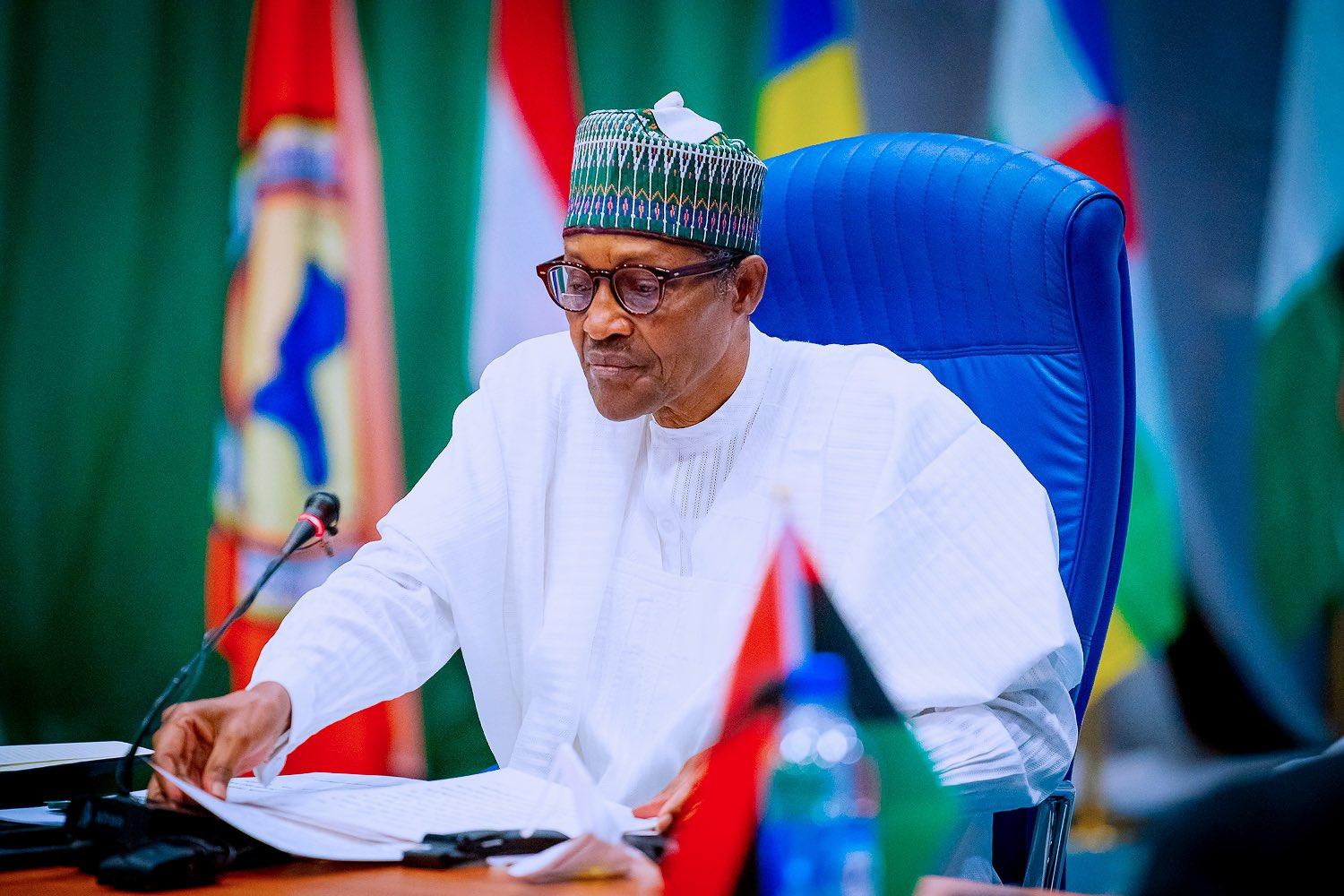Many Nigerians go hungry as food inflation increases
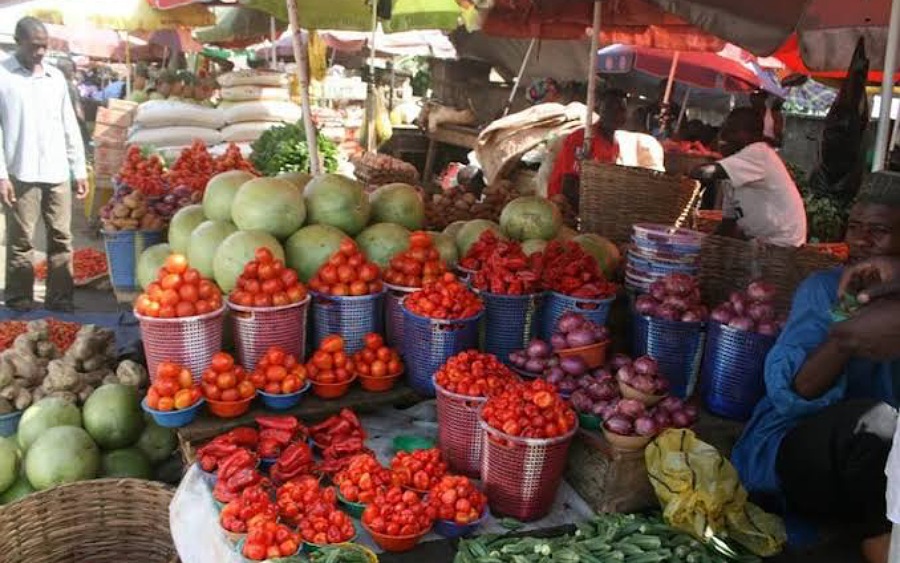
How to tackle food inflation: World Bank Country Director
By Daniel Adaji
Nigeria food inflation is on the increase and many Nigerians may be food-insecure in the year 2023. As of March 2023, food inflation had risen to 24.45% on a year-on-year basis, according to the National Bureau of Statistics (NBS).
This increase resulted in 7.25% points higher compared to the rate recorded in March 2022 (17.20%). The average annual rate of food inflation for the 12 months ending March 2023 over the previous twelve months’ average was 22.72%.
This is happening at a time when citizens are just recovering from the impact of the cash crunch that hit the country between December and March 2023.
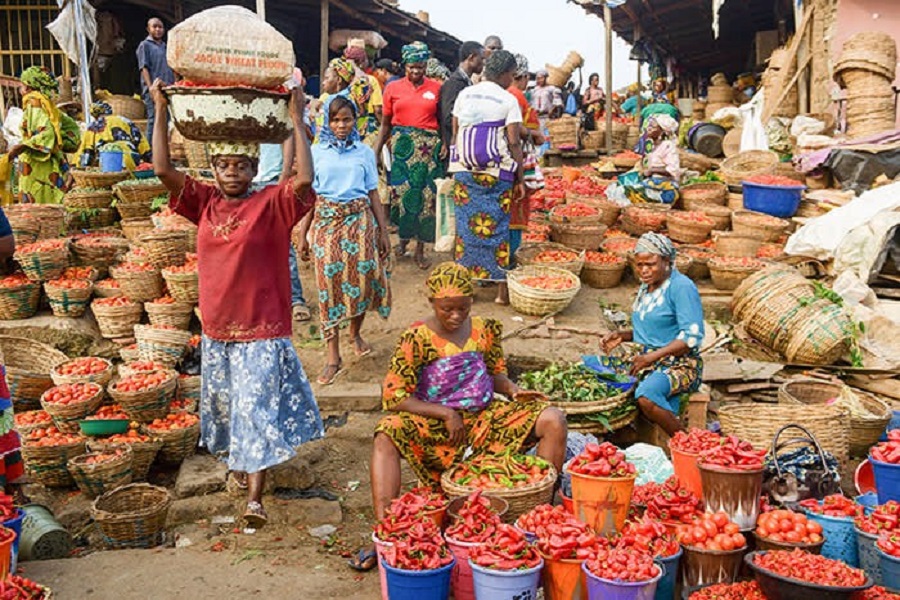
A food market in Nigeria. Photocredit: ICIR
How a country where general inflation is on the increase would cope with high food inflation is a matter of serious concern.
Trends have continued to show that Nigeria inflation rate is on the increase despite promises by government at all levels to reduce inflation rate and lift millions of Nigerians out of poverty.
For instance, President Buhari promised to lift 100 million Nigerians out of poverty in 10 years. Less than 40 days to the end of his tenure, Nigerians classified as mutidimentionally poor had risen to 133 million and headline and food inflation is on a rapid increase, according to National Bureau of Statistics, NBS statistics.
The recent data published by the National Bureau of Statistics shows that in March 2023, the headline inflation rate rose to 22.04% compared to February 2023 head-
line inflation rate which was 21.91%.
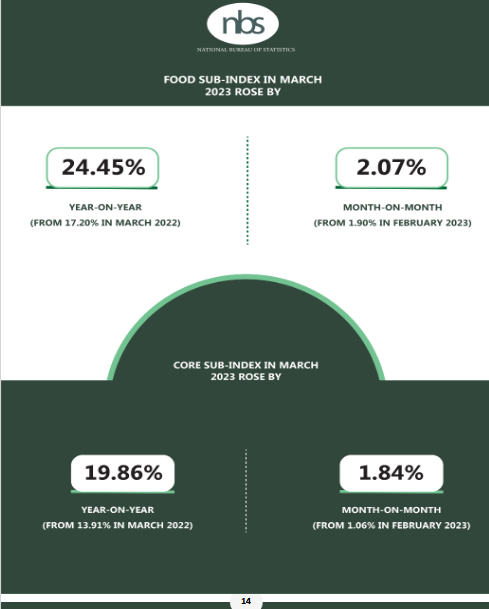
Chart of the food sub-index in March 2023. Credit: NBS
When compared on a year-on-year basis, the headline inflation rate was 6.13% points higher than
the amount recorded in March 2022 was 15.92%. Over 5% increase in inflation in just a year is alarming and portents a worst economy for the country if the trends continues.
Particularly, inflation due to food and non-alcoholic beverages is put 11.42% out of the headline inflation for the month of March 2023 and the highest among other items put at a total of 10.62%. Food inflation alone contributed about 51.82% to the headline inflation.
An expert with the Food and Agriculture Organisation (FAO), Daniel Gustafson explained that “Households cope with high prices, drought, economic crises and other shocks that limit their access to food in a variety of ways.
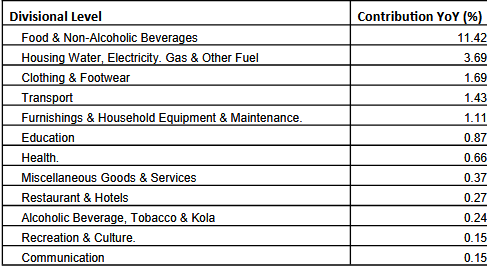
All items index. Crredit: NBS
“Some of these are food-based coping strategies and some are non-food-based. Food-based strategies include changes in quality, quantity and diversity and often start with reducing the number of foods consumed from different food groups, shifting from higher-cost calories to lower cost ones.
“Where food prices of staple cereals go up dramatically there are often very few other cheaper alternatives, as prices of other foods also rise. Eating fewer meals per day and shifting the distribution within the household is another strategy.
“Non-food coping strategies include spending less on health and education, selling off assets, and seeking other income-generating activities. When the latter includes increased female employment it can lead to less or lower-quality child care at home. It can interfere with breastfeeding, home-based food preparation, sanitation practices and seeking medical attention when children are sick.
“Increased child labour, at home or outside can have additional nutritional consequences. Shocks such as these can result in poverty traps, whereby a short-term event causes permanent damage,” he said.
The urban inflation rate was 23.07% in March 2023; this was 6.63% points higher compared to the 16.44% recorded in March 2022. The rural inflation rate in March 2023 was 21.09% on a year-on-year basis; this was 5.67% points higher compared to the 15.42% recorded in March 2022.
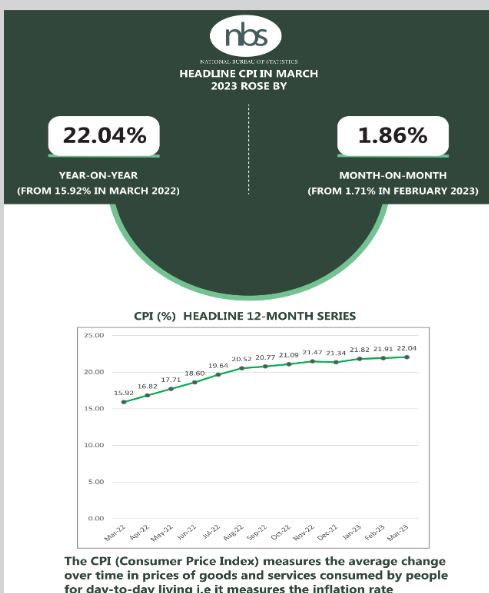
Experts view on Nigeria Inflation
Experts explained that the causes of inflation in Nigeria include the following:
Insecurity
Nigeria has been battling insurgency since the beginning of the democratic era in 1999. This civil unrest has drastically reduced farmers’ participation in food production particularly in the North East where most cases of killings and destruction of properties have been recorded.
As a result, cost of food items has risen in accordance with the law of demand and supply which states that when there is high demand and low supply, price goes up.
Government Economic Policies
The policies of the federal government through the Central Bank of Nigeria (CBN) have contributed immensely to worsening inflation in Nigeria.
For instance the printing of notes for spending by government injects so much money into the system thus raising inflation naturally by making sellers of goods and services to raise their prices because of the money in circulation.
Devaluation of the Naira
Devaluation of the Naira may have a few advantages such as increase in export, reduced trade deficit and others but a major disadvantage is that it leads to inflation due to lower purchasing power.
Increased Wages
Workers place demands on employers for higher wages as a result of the biting effects of prices in the market. However increasing wages will only make it worse because higher wages will increase spending power and so flood the market with money, which further increases inflation. In other words, higher wages equals higher purchasing power which equals higher inflation.
The price of Fuel
Fuel used for vehicles that transport goods determines the prices of most items. Therefore an increase in the price of fuel leads to an increase in the prices of goods. This is the situation today since the pump price for petrol is 145 Naira as opposed to 97 Naira three years ago.
The petrol is also scarce so black marketers further increase the price particularly in rural areas where food items have to be transported to cities. Inflation in food prices therefore is inevitable.
Reduction in Productivity
Apart from the decline in food production by farmers due to insecurity, decline in production of finished goods may also cause inflation.
This is a major problem in Nigeria because of epileptic power supply which may increase cost of production. If industries reduce production due to any of these factors then supply decreases and prices will go up.
Higher Taxes
There has been a recent increase in taxation in Nigeria especially on imported goods. This discourages importation of goods and it discourages investors who may want to establish businesses in the country.
This causes scarcity of goods and so leads to an increase in prices, thereby causing inflation.
Expectation of Inflation
Sometimes no obvious reasons cause inflation but the fear of inflation itself. When workers perceive inflation, they demand increased wages. If this demand is granted, the market gets so much money which in turn leads to the inflation they were trying to avoid.
Pre-election and Campaign Spending
As is the custom in Nigeria, as elections draw near, politicians spend so much money to get voters to vote for them since they have not done anything for those voters to deserve their votes.
This brings so much money into the economy and therefore causes inflation because traders will increase their prices as they see money in circulation.
Poverty
Prices of goods and services may rise not because of any of the above mentioned reasons but because the sellers are trying to make ends meet. The profits from sales are not enough to cater for their families so they raise their prices.
How to tackle food inflation
The World Bank suggested that to reduce inflation and accelerate economic recovery in the country, a critical reform is needed. In an article titled “Resilience through Reforms” the World Bank Country Director for Nigeria Shubham Chaudhuri noted that; “Nigeria faces interlinked challenges in relation to inflation, limited job opportunities, and insecurity. While the government has made efforts to reduce the effect of these by advancing long-delayed policy reforms, it is clear that these reforms will have to be sustained and deepened for Nigeria to realize its development potential.”
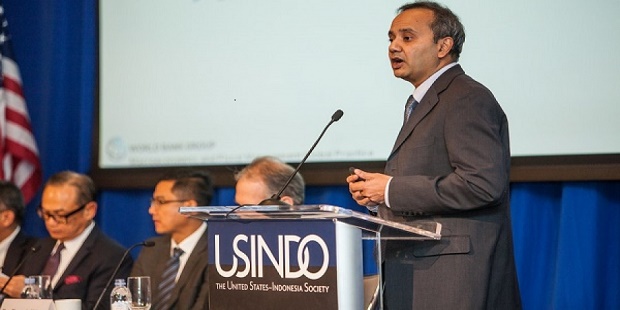
World Bank Country Director, Shubham Chaudhuri. Photocredit:Africa Oil & Gas Report
In the document, the world apex financial institution also suggested that the country should; “Reduce inflation by implementing policies that support macroeconomic stability, inclusive growth, and job creation; Protect poor households from the impacts of inflation and Facilitate access to financing for small and medium enterprises in key sectors to mitigate the effects of inflation and accelerate the recovery.”
Reduce inflation by implementing policies that support macroeconomic stability
Also, Marco Hernandez, the World Bank Lead Economist for Nigeria stated that;
“Given the urgency to reduce inflation amidst the pandemic, a policy consensus and expedite reform implementation on exchange-rate management, monetary policy, trade policy, fiscal policy, and social protection would help save lives, protect livelihoods, and ensure a faster and sustained recovery.”
Read also…‘How Tinubu will tackle terrorism, banditry, secessionist’
The Insight Report
Nigeria Coverage



